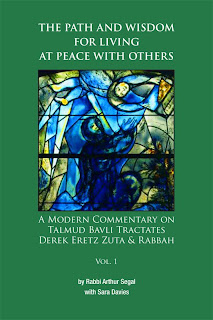CHUMASH CANDESCENCE
PARASHA TERUMAH
EXODUS 25:01 TO 27:39
Rabbi Arthur Segal www.jewishspiritualrenewal.org
Via Shamash Org on-line class service
Jewish Renewal www.jewishrenewal.info
Jewish Spiritual Renewal
Jewish Spirituality
Eco Judaism
Hilton Head Island, SC, Bluffton, SC, Savannah, GA
On a quick reading, this week's Torah portion can appear to some of us to
be from Architectural Digest. It contains blueprints given to Moses by
God on how to construct the Mishkan, the Tabernacle and resting place of
God. The corresponding Haftarah from First Kings 5:26 gives King
Solomon's plans for the building of the First Temple in Jerusalem, which
adapt the plans of our dessert Mishkan.
One of the earliest commandments given to our ancestors in the
construction of the Tabernacle has to do with its portability. In Ex
25:12 we were commanded to put four gold rings on the Holy Ark, two on each
side. In the next verse we are told to make wooden poles covered in gold
that will fit thru these rings. And in verse 15, we are given the mitzvah
of : "The poles will remain in the rings, they shall NOT be removed from
it." And into this portable Ark will go the Tablets signifying the Torah.
Traditionally, we are taught in Talmud tractate Sotah (daf 35A) that the
ark's bearers held the poles on their shoulders. When we read the
measurements of the Ark and its weight with all of the gold, we wonder
how men could carry this Holy object. The rabbis explain that in
"reality," the ark bore the bearers, because when it moved they were
lifted with it. Perhaps homiletically we can better say that Torah, what
is inside the Ark, sustained our people throughout the millennia.
In the nineteenth century, Rabbi Hirsch, who was quoted last parasha in this
series, stated that the eternal presence of the non-removable poles
symbolized the concept that Torah is not tied to any one place. Wherever
Jews go, willingly or other wise, he writes, Torah goes with us, as its
means of transport are always attached to it. How have we transported
Torah over the centuries? We have done so not with buildings built for
vanity but through study and transmission of Judaic values from
generation to generation. In Ex 25:08, note that we are commanded to "make a
sanctuary for Me--so that I may dwell among them." We are to build our
modern synagogues, and even their additions dedicated, to God's service.
Says Rashi, 900 years ago, elegant synagogues are meaningless if built
for ego's sake and not God's sake.
God, we are taught in the Mishna Pirkei Avot, dwells among us in a
variety of ways even after the Temples were destroyed. The rabbis said
that God's Holy presence resides among us when two study Torah or when
three or more eat and discuss Torah. The Talmud teaches that God dwells
with us when we do charitable works, when we make love, and even when we
are ill. It was the idea of portability, the actual commandment of
portability, set forth in this week's parasha, that kept our religion
going and moving forward through the help of our rabbinic teachers after
the Temples' disappearance.
Frankly, it has been posited that the sacking of
the Temple was the best thing in the long run for Judaism as it destroyed
the priestly sacrificial cult. This allowed Judaism to grow and adapt,
becoming a modern religion. We have produced wonderful leaders,
scientists, scholars, healers, and philosophers who otherwise might
have been spending their time sprinkling blood on the altar.
What we Jews have learned is that our religion is not confined to the
Mishkan in the Sinai, to the Temples of Jerusalem, or to our synagogues
on Shabbats. Our religion is a way of life, a way of living our lives.
God is everywhere. God does not just reside in the Tabernacle.
Being good, decent people brings God into our midst. We do not need a high priest to
say God's name secretly once a year for us. By doing good, studying and
transmitting Torah to our children (and ourselves), by taking time off
for renewal each Shabbat, being good parents, being good spouses, being
good friends and doing ahavath chesed (acts of loving kindness), we
build our own spiritual Mishkan over ourselves for God to dwell with us.
The German Jewish philosopher Martin Buber drew a detailed commentary
between the chapter of Genesis, where God creates the world, and this
chapter Terumah and others in Exodus where we create God's resting place
on earth. In Gen 2:1-2 "God finished the work," and in Ex 40:33 "Moses
finished the work." In Gen 1:31 God "beholded" that His work was very
good and in Ex 39:43, our people "beholded" their work. It is we, now,
who have the obligation to bring the Shekinah of God's Holy Presence
every day into our lives and into the lives of those around us. We
imitated God, according to Nehama Leibowitz in "Studies in Shemot
(Exodus)" by building the Tabernacle and the Temples as God built the
universe.
We need to continually imitate God by doing acts of
kindness, justice, mercy, and love as well. Buber says that God dwells wherever we let him in. The Gaon Sa'adia says there is no place without God. Was God there in Dachau? Yes, crying along with us.
Each of us today needs to be our own portable Tabernacle, continually
rebuilding the Mishkan in our own souls and hearts, and as the prophet
Micah said "walk humbly with God."
Shabbat Shalom,
RABBI ARTHUR SEGAL
Via Shamash Org on-line class service
Jewish Renewal www.jewishrenewal.info
Jewish Spiritual Renewal
Jewish Spirituality
Eco Judaism
Hilton Head Island, SC, Bluffton, SC, Savannah, GA
























